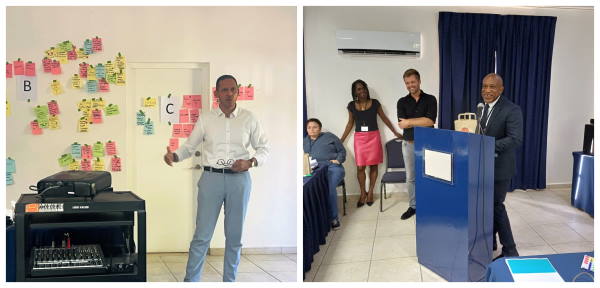 WILLEMSTAD/PHILIPSBURG:---The collaboration among law enforcement agencies from the six islands of the Dutch Caribbean is bearing fruit, as demonstrated during the Milestone Meeting of the Development of Information Organizations Project Carib (DIOC) on October 22 and 23 in Bonaire. Increasingly, information is being exchanged, leading to a clearer picture of crime in the region. Leaders from the four police forces of the Dutch Caribbean, the Kingdom Detectives Cooperation Team, the Caribbean Coast Guard, and the Royal Netherlands Military Police gathered for two days to discuss the status of regional information exchange in the fight against crime. The Attorney General of Curaçao, Sint Maarten, Bonaire, Sint Eustatius, and Saba were also present, along with chief public prosecutors and information officers from various public ministries. The opening was led by the lieutenant governor of Bonaire, Mr. John Soliano, the Chief of Police of Bonaire, Mr. Alwyn Braaf, and the Information Coordination Portfolio Holder, Mr. Juri Nicolaas, appointed through the Judicial Four-Party Consultation.
WILLEMSTAD/PHILIPSBURG:---The collaboration among law enforcement agencies from the six islands of the Dutch Caribbean is bearing fruit, as demonstrated during the Milestone Meeting of the Development of Information Organizations Project Carib (DIOC) on October 22 and 23 in Bonaire. Increasingly, information is being exchanged, leading to a clearer picture of crime in the region. Leaders from the four police forces of the Dutch Caribbean, the Kingdom Detectives Cooperation Team, the Caribbean Coast Guard, and the Royal Netherlands Military Police gathered for two days to discuss the status of regional information exchange in the fight against crime. The Attorney General of Curaçao, Sint Maarten, Bonaire, Sint Eustatius, and Saba were also present, along with chief public prosecutors and information officers from various public ministries. The opening was led by the lieutenant governor of Bonaire, Mr. John Soliano, the Chief of Police of Bonaire, Mr. Alwyn Braaf, and the Information Coordination Portfolio Holder, Mr. Juri Nicolaas, appointed through the Judicial Four-Party Consultation.
This meeting was the third in a series organized by the Board of Police Chiefs from Aruba, Caribbean Netherlands, Curaçao, and Sint Maarten. The Board has been investing in strengthening the information organizations of the police forces and in data-driven operations for several years. This means that law enforcement agencies utilize as much information as possible about crime and criminal networks. This information is then analyzed to reveal trends and patterns in criminal activities. Data-driven operations enable better decision-making regarding resource allocation and help predict where criminal activities are likely to occur. It also provides police with more insight into who is involved in criminal activities.
Criminal networks are now so well organized that they can collaborate globally to smuggle drugs, weapons, and people across continents. This necessitates strong cooperation among law enforcement to combat criminal activities and dismantle these networks.
The need for data-driven operations was underscored by keynote speaker Dr. Evan Ellis, a research professor of Latin American studies at the U.S. Army War College Strategic Studies Institute, specializing in transnational organized crime in Latin America and the Caribbean. In his presentation, he extensively discussed security threats in the Caribbean part of the Kingdom, including the firearm crisis fueled by a deadly combination of drugs, weapons, and gangs, resulting in high murder rates. More cocaine is being produced than ever before. Venezuela is now also cultivating cocaine. The threat from criminal networks in Venezuela persists, and many Venezuelans continue to leave the country. Other hotspots in the region and beyond contribute to undocumented migrants who are vulnerable to human smuggling and trafficking.
The Board of Police Chiefs and its partners will continue to invest in collaboration and information sharing. The chair of the College, Mr. Carl John, expressed his satisfaction with the progress made but emphasized that much work remains to be done to achieve a lasting impact.










